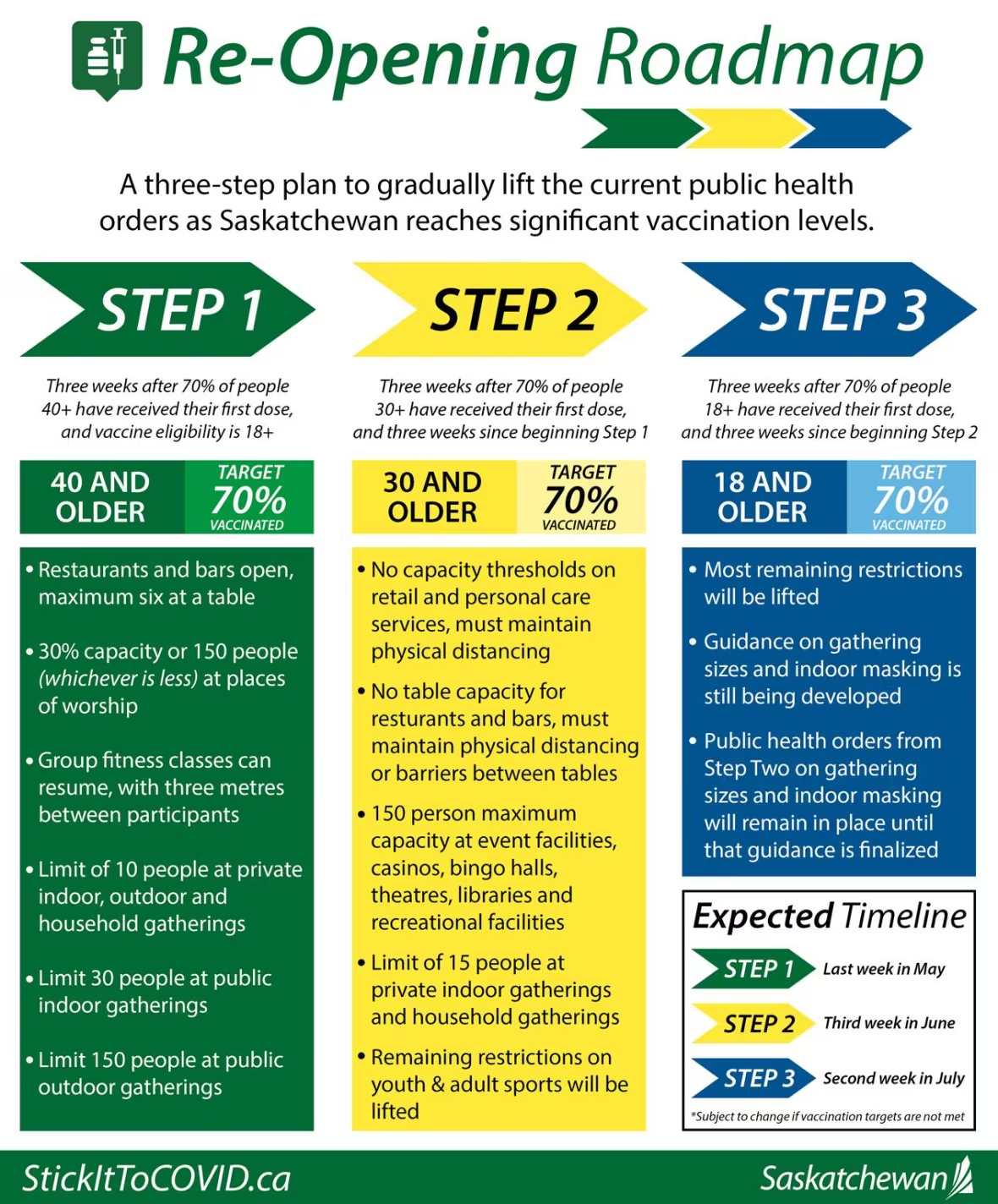3-step plan to relax COVID-19 rules in Sask. an 'incentive' to get vaccinated, province says
First easing of rules could take place in last week of May, if the desired vaccination rates are achieved
The Saskatchewan government has released a three-step plan to gradually relax provincial COVID-19 public health measures, with some current restrictions potentially being eased as soon as late May — if the government's desired vaccination targets are met, that is.
In a news release issued Tuesday, the province openly stated that the plan is meant in part as "an incentive" for Saskatchewan residents to follow health measures and get vaccinated.
"Those are the two things we all need to do in order to move forward through the three steps of reopening so we can enjoy a great Saskatchewan summer and get back to normal," Premier Scott Moe said in the release.
Moe said during a later news conference he knows some people are still on the fence about getting vaccinated.
"It's time for you to get off that fence," he said, adding that Saskatchewan is expected to receive more than 300,000 more doses of COVID-19 vaccine in May.
The potential timeline for the reopening plan — with the rules being increasingly relaxed or removed in the last week of May, the third week of June and finally in the second week of July — is "subject to change if vaccination targets are not met," according to a graphic also released by the province.
The graphic also outlined the specific changes associated with each step — everything from allowing group fitness classes to resume during Step One to removing current capacity limits for stores in Step Two.
Scrapping the need to wear masks is not mentioned in the plan, though under Step Three the graphic notes "guidance on gathering sizes and indoor masking is still being developed."

The rule changes will apply equally to partially vaccinated, fully vaccinated and unvaccinated people.
Each of the three stages of change has two thresholds that must be met before it is triggered:
- Step One - Last week of May: It has been three weeks since 70 per cent of residents aged 40 and above have received their first dose, and vaccine eligibility has opened to all adults ages 18 and older across the province.
- Step Two - Third week of June: It has been three weeks since 70 per cent of residents age 30 and above have received their first dose and three weeks since Step One began.
- Step Three - Second week of July: It has been three weeks since 70 per cent of residents age 18 and older have received their first dose and three weeks Step Two began.
As of Tuesday, 65 per cent of Saskatchewan residents aged 40 and over had received their first dose of COVID-19 vaccine.
Read the full reopening plan here:
(PDF KB)
(Text KB)CBC is not responsible for 3rd party content
Moe was joined by provincial chief medical health officer Dr. Saqib Shahab during the news conference and was asked why other metrics — such as COVID-19 hospitalizations — are not being cited in the plan.
Moe said vaccination numbers are what drive down hospitalizations.
Shahab added the province will keep an eye on hospitalization and transmission rates.
Ryan Meili, the leader of the Saskatchewan NDP, said the plan should be pegged to those metrics.
"If Moe and co. only look at vaccination rates and ignore community transmission, test positivity and hospitalizations, they are playing a very dangerous game indeed," Meili tweeted.
We all want to see people vaccinated. We all want to see an end to the pandemic. We all want to re-open.<br><br>But if Moe and co. only look at vaccination rates and ignore community transmission, test positivity and hospitalizations, they are playing a very dangerous game indeed.
—@ryanmeiliThe number of infected COVID-19 patients under intensive care could influence the plan in one way, Moe said. If Saskatchewan were to meet the metrics for any step earlier than anticipated, the province would need to consider the hospitalization and ICU situation before actually proceeding earlier with that step, the premier said.
The announcement of the plan comes after weeks of Saskatchewan doctors warning that intensive care wards, particularly those in Regina, face a higher-than-normal patient load due to people infected with COVID-19.
Younger COVID-19 patients are being admitted to ICUs and staying for longer periods of time, according to the latest COVID-19 info sheet shared among Saskatchewan Health Authority physicians last Thursday.

The number of COVID-19 patients in Regina ICUs has decreased in the last two weeks, from 35 on April 20 to 21 as of Monday.
During the same period, the number of Saskatoon ICU patients with COVID has inched up, from 10 to 14.
Overall COVID-19 hospitalizations across the province went from 195 to 174 during that time frame.
With files from Alexander Quon and Adam Hunter

